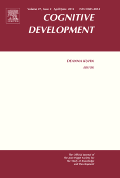
COGNITIVE DEVELOPMENT
Scope & Guideline
Exploring the Depths of Cognitive Growth
Introduction
Aims and Scopes
- Cognitive Processes in Children:
Research exploring the mechanisms of cognitive processes such as memory, attention, and executive functions in children, examining how these processes develop over time and their role in learning. - Language and Communication Development:
Studies on how children acquire language, understand communication, and develop narrative skills, including the influence of bilingualism and parental interaction on language acquisition. - Social Cognition and Moral Development:
Investigations into how children perceive social dynamics, develop moral reasoning, and understand concepts like fairness, trust, and empathy within social contexts. - Influences of Environment and Context:
Research examining the impact of familial, cultural, and educational environments on children's cognitive and emotional development, including studies on socioeconomic factors. - Mathematical and Scientific Understanding:
Papers focusing on the development of mathematical reasoning, numerical understanding, and scientific inquiry skills in children, emphasizing early education and intervention strategies. - Developmental Disorders and Differences:
Research addressing cognitive development in children with atypical development, such as those with autism spectrum disorder or attention deficit hyperactivity disorder, providing insights into their unique learning processes.
Trending and Emerging
- Interdisciplinary Approaches:
An increasing number of studies are utilizing interdisciplinary methods, combining insights from psychology, neuroscience, education, and sociology to provide a more comprehensive understanding of cognitive development. - Impact of Digital Media on Development:
Research focusing on how digital media and technology influence cognitive and socio-emotional development is on the rise, reflecting contemporary concerns about screen time and educational technology. - Culturally Responsive Research:
There is a growing emphasis on culturally relevant methodologies and frameworks that consider the impact of culture on cognitive development, leading to more inclusive research practices. - Longitudinal Studies:
An increasing number of longitudinal studies are being conducted, allowing researchers to track cognitive development over extended periods and understand the long-term effects of early experiences. - Focus on Executive Function and Self-Regulation:
Research centered on executive function and self-regulation skills is trending, exploring their critical role in academic success and social interactions among children. - Understanding Cognitive Development in Diverse Contexts:
Emerging themes are addressing cognitive development in various contexts, such as refugee children, children in poverty, and bilingual environments, highlighting the importance of context in shaping cognitive outcomes.
Declining or Waning
- Overemphasis on Traditional Developmental Milestones:
There has been a noticeable reduction in studies strictly adhering to traditional developmental milestones, as the focus shifts towards more dynamic and contextualized understandings of cognitive growth. - Narrow Experimental Paradigms:
Research employing highly controlled laboratory settings is appearing less frequently, as there is a growing preference for studies that reflect real-world complexities and ecological validity. - Static Theoretical Models:
Theoretical frameworks that do not account for the variability and fluidity of cognitive development are becoming less favored, with a shift towards more integrative and dynamic models. - Focus on Homogeneous Samples:
There is a declining trend in research that exclusively examines homogeneous populations, as the journal increasingly prioritizes diverse and representative samples to better understand cognitive development across different contexts.
Similar Journals

Journal of Neuropsychology
Innovating Insights into Psychological FunctionsThe Journal of Neuropsychology, published by WILEY, is a premier academic journal dedicated to advancing the field of neuropsychology and its related disciplines. With a focus on behavioral and cognitive neuroscience, this journal presents cutting-edge research that informs our understanding of psychological functions and their underlying neural mechanisms. Operating with an impressive impact factor representative of its rigorous peer-review process, the journal has established itself within the Q2 and Q3 quartiles of multiple relevant categories, including Neuropsychology and Physiological Psychology. Researchers will find the ISSN 1748-6645 and E-ISSN 1748-6653 useful for academic referencing as they explore articles that span innovative methodologies and insights into neurological conditions. Published continuously since 2007, the Journal of Neuropsychology stands as a vital resource for professionals and students alike, fostering scholarly discourse and knowledge exchange in neuropsychological research.
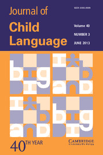
JOURNAL OF CHILD LANGUAGE
Advancing Insights into Child Language AcquisitionJOURNAL OF CHILD LANGUAGE, published by Cambridge University Press, is a premier scholarly journal dedicated to the exploration and examination of language development in children. Since its inception in 1974, the journal has become an authoritative source in the fields of Developmental and Educational Psychology, Experimental and Cognitive Psychology, and Linguistics, boasting significant impact as evidenced by its ranking in the top quartiles across these domains. With an impressive impact factor and a commitment to advancing research, the journal serves as a vital platform for researchers, educators, and practitioners interested in the intricacies of language acquisition and cognitive development in children. The 2023 Category Quartiles place it in Q1 for Linguistics and Language, further establishing its excellence. Fostering a rich intellectual community, the journal invites contributions that advance our understanding of child language, promising a broad readership in both the social sciences and humanities.

DEVELOPMENTAL SCIENCE
Illuminating the Path of Human DevelopmentDEVELOPMENTAL SCIENCE, published by Wiley, is a premier international journal dedicated to advancing the field of developmental psychology and cognitive neuroscience. With an ISSN of 1363-755X and an E-ISSN of 1467-7687, this journal has established itself as a vital resource for researchers and practitioners alike since its inception in 1998. The journal is esteemed for its rigorous peer-reviewed articles that explore key aspects of human development, contributing to its remarkable impact factor and prestigious rankings: it is categorized in Q1 in both Cognitive Neuroscience and Developmental and Educational Psychology, placing it in the top tiers of scholarly work. Notably, it holds an impressive Scopus rank of #30 out of 360 in Developmental and Educational Psychology and #19 out of 115 in Cognitive Neuroscience. The continuous exploration of developmental processes, education, and cognitive functions makes DEVELOPMENTAL SCIENCE an indispensable tool for those striving to deepen their understanding or contribute to these dynamic fields. Although the journal follows subscription-based access options, its high-quality findings offer invaluable insights for academicians, students, and professionals committed to the evolving landscape of developmental research.
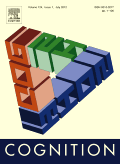
Cognition
Innovating Insights in Cognitive Neuroscience and PsychologyCognition, published by Elsevier, is a leading journal dedicated to the exploration and advancement of knowledge in the multifaceted fields of cognitive neuroscience, cognitive psychology, and linguistics. Since its inception in 1972, this prestigious journal has established itself as a prominent platform for disseminating innovative research and critical reviews, achieving a remarkable Q1 ranking across various relevant categories, including Cognitive Neuroscience and Developmental Psychology, as per the 2023 metrics. With a focus on providing insights that are vital for researchers, professionals, and students alike, Cognition boasts an impressive standing in the academic community, evidenced by its high Scopus rankings which place it in the top percentiles in several disciplines. Researchers interested in the cognitive processes underlying human thought, language, and behavior will find Cognition an invaluable resource that publishes cutting-edge findings and fosters interdisciplinary collaboration. Though it operates under a traditional access model, the breadth and depth of its content ensure it remains integral to advancing cognitive science.

Psycholinguistics
Fostering Insightful Research in Psycholinguistics.Psycholinguistics is a distinguished academic journal published by the STATE HIGHER EDUCATIONAL ESTABLISHMENT in Ukraine, specializing in the intersection of psychology and language. Since its inception, this journal has transitioned to an Open Access model in 2017, offering unrestricted access to its rich repository of research that contributes to the field's understanding of cognitive processes and linguistic functions. With an impressive Q2 classification in Linguistics and Language and a Q4 classification in Experimental and Cognitive Psychology as of 2023, Psycholinguistics garners significant attention among scholars, evidenced by its notable rankings in Scopus. The journal serves as a vital platform for researchers, professionals, and students, enabling the dissemination of innovative findings and theoretical advancements in psycholinguistics. Its commitment to high-quality scholarship and open access makes it a valuable resource for those engaged in the exploration of language acquisition, processing, and cognitive aspects of linguistic behavior.
Address: VUL SUKHOMLYNSKOHO 30, PEREYASLAV-KHMELNYTSKYI 08400, UKRAINE.

Journal for the Study of Education and Development
Exploring the intersection of learning and growth.The Journal for the Study of Education and Development, published by SAGE Publications Inc, is a leading academic peer-reviewed journal dedicated to advancing knowledge in the fields of educational and developmental psychology. Established in 1978 and operating through the United Kingdom, this journal provides a platform for contemporary research, theoretical discussions, and critical reviews that inform practices and policies in education. With an H-index reflecting its impact and citation metrics, it ranks in the Q3 category for both Developmental and Educational Psychology and Education as of 2023. Notably, it holds a Scopus rank of #722/1543 in Social Sciences - Education and #218/360 in Psychology - Developmental and Educational Psychology, placing it in the 53rd and 39th percentiles, respectively. The journal is committed to open access, ensuring that the insights found within its pages are readily available to researchers, professionals, and students alike. By contributing to ongoing dialogues and innovations in educational contexts, the Journal for the Study of Education and Development remains an essential resource for those looking to foster growth and development in educational settings.

JOURNAL OF COGNITIVE NEUROSCIENCE
Illuminating the connections between brain and behavior.Welcome to the JOURNAL OF COGNITIVE NEUROSCIENCE, a premier publication in the field of cognitive neuroscience, published by the esteemed MIT PRESS. Since its inception in 1989, this journal has been at the forefront of advancing our understanding of the neural mechanisms underlying cognitive processes, boasting an impressive convergence period through 2024. With its Q1 ranking in the 2023 cognitive neuroscience category, it stands out among 115 peers, indicating its critical role in shaping contemporary research. The journal offers a comprehensive array of research articles, reviews, and methodologies aimed at researchers, professionals, and students alike, facilitating the exploration of complex cognitive functions. While not an open-access journal, it provides essential insights and significant contributions to the neuroscience community, making it an invaluable resource for anyone keen on delving into the intricacies of the human brain.
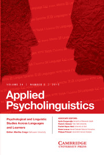
APPLIED PSYCHOLINGUISTICS
Illuminating the Pathways of Language AcquisitionApplied Psycholinguistics, published by Cambridge University Press, is a premier journal in the fields of linguistics, psychology, and cognitive science, with a focus on the intersection of language and psychological processes. Since its inception in 1980, the journal has consistently provided a platform for high-quality research, achieving impressive rankings in various categories as of 2023, including Q1 status in Linguistics and Language, and Q1 in Psychology (miscellaneous). With a focus on experimental and cognitive psychology, it fosters the exploration of language acquisition, social communication, and cognitive mechanisms underlying language use. Although it is not available as an Open Access journal, its rigorous peer-review process and impactful articles make it a significant resource for researchers, professionals, and students alike. The journal's commitment to advancing knowledge is evident through its contributions to both theoretical and applied psycholinguistic research. Whether you're a seasoned researcher or a student eager to delve into psycholinguistics, this journal serves as an essential resource for keeping abreast of cutting-edge developments in the discipline.
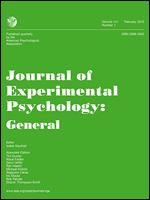
JOURNAL OF EXPERIMENTAL PSYCHOLOGY-GENERAL
Connecting Theories with Empirical EvidenceJOURNAL OF EXPERIMENTAL PSYCHOLOGY-GENERAL, published by the American Psychological Association, is a leading journal in the field of experimental and cognitive psychology. With an ISSN of 0096-3445 and a robust impact factor that reflects its significant contribution to research, this journal serves as a premier outlet for empirical studies that advance our understanding of psychological processes across development and cognition. Covering a wide array of topics from developmental neuroscience to general psychology, it is categorized in the Q1 quartile across multiple fields, making it a vital resource for researchers, professionals, and students alike. The journal has maintained a consistent publication record since its inception in 1975, continuously freeing insights that shape the future of psychology and related disciplines. With rigorous peer review and high standards of scholarly excellence, JOURNAL OF EXPERIMENTAL PSYCHOLOGY-GENERAL remains an essential platform for disseminating innovative psychological research.
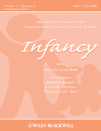
INFANCY
Elevating research on the earliest stages of life.INFANCY is a leading academic journal published by Wiley, dedicated to advancing the field of child development and psychology. With an ISSN of 1525-0008 and an E-ISSN of 1532-7078, this journal showcases high-quality, peer-reviewed research focusing on the early stages of human development, making it an invaluable resource for researchers, practitioners, and students in the fields of Pediatrics, Perinatology, and Developmental Psychology. As of 2023, INFANCY stands notable with an impressive impact factor, ranking in the second quartile for Developmental and Educational Psychology and the first quartile for Pediatrics, Perinatology, and Child Health. This ranking reflects its commitment to publishing cutting-edge research impactful in shaping health policies and educational practices. With its convergence years extending from 2000 to 2024, INFANCY remains a vital platform for disseminating innovative findings that address pressing issues in early childhood development and care. Researchers looking to contribute valuable insights will find this journal an essential avenue for impactful academic discourse and professional growth.